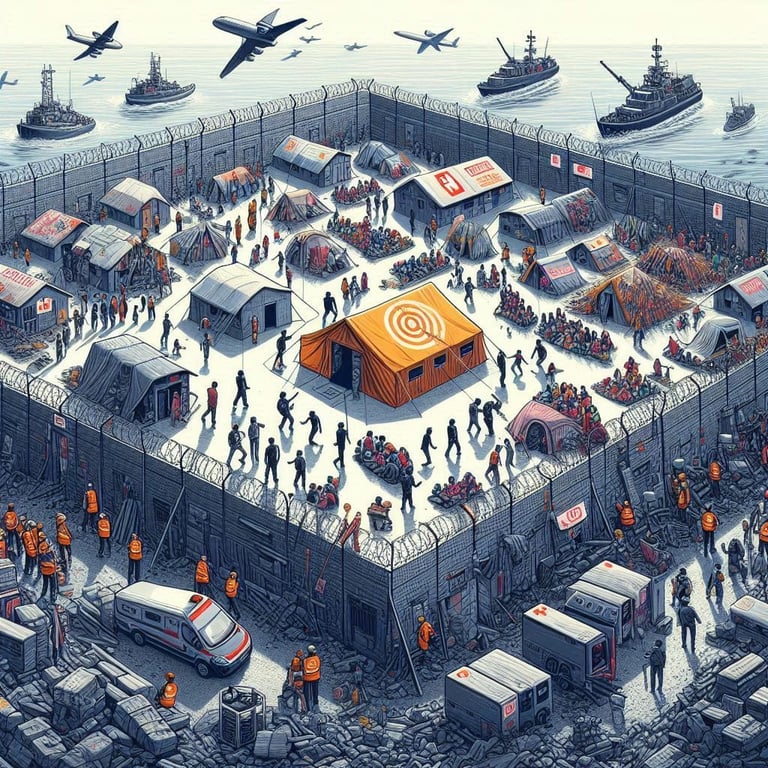Protecting The Vulnerable: The Role Of International Humanitarian Law In Safeguarding Refugee Camps, Hospitals, And Schools In The Israel-Gaza Conflict
Maria Binte Belal
Chandigarh University
This Blog is written by Maria Binte Belal, a Law Graduate of Chandigarh University


Introduction
In light of Gaza Conflict Serious doubts have been expressed about the applicability and the viability of international law. On October 7, After more than 1,200 Israeli people were killed and more than 200 captives were taken by Hamas, the humanitarian crisis is still ongoing months later. In retaliation, Israel has killed over 40,000 individuals, the most of them were women and children. These attacks have been damaging and unrelenting. Given the challenges of keeping an eye on individuals trapped beneath debris or outside of Gaza's hospitals, the startling death and injury toll is probably an underestimate. The fact that, despite this intensely divisive war, both sides maintain their adherence to international law and have brought important concerns regarding the dispute before international adjudicatory institutions is a testament to the relevance and significance of international law. This is where there is some optimism since international law offers crucial direction on universal values of respect for humankind.
The Core doctrines of IHL
International Humanitarian law is a branch of international law. This law limits the violence in armed conflicts. Core doctrines of IHL are-
1. Only fighters can be directly targeted
2. Fighters could be targeted in normal circumstances but not the condition of wounded and injured.
3. IHL prohibits unnecessary sufferings and redundant injury.
4. Military necessity permits involved in conducts even result of such action can be destruction but it doesn’t mean military force will ignore humanitarian consideration.
5. IHL limits harms to civilians.
These principles are foundational to IHL’s aim to limit suffering in times of war. However, as the Israel-Gaza conflict shows, sticking to these principles are increasingly difficult in complex, asymmetric warfare situations.
Role of IHL Safeguarding Refugee Camps, Hospitals and School
Homes, infrastructure, schools, and hospitals are all considered to be civilian buildings. Article 52(1) of the Additional Protocol I to the Geneva Conventions (1977) classifies all things as civilian as long as they do not serve as military objectives. The Geneva Conventions, which form the basis of International Humanitarian Law (IHL), guarantee the protection of these civilian items. Particularly speaking, the protection of civilian property during armed conflicts is covered in Additional Protocol I's Article 52. The Rome Statute's Article 8(2)(b) makes clear that it is illegal to purposefully launch assaults on people or civilian property, as well as against targets used in peacekeeping or humanitarian aid. According to Article 52(2) of Additional Protocol I, civilian targets cannot be the target of a counterattack; only military objectives may be legitimately targeted. All essential precautions must be taken by parties involved in a conflict to prevent damage to civilian property. Furthermore, in accordance with Article 18 of the Geneva Conventions, medical and religious workers serving the civilian population must always be respected and safeguarded. They have the right to perform their humanitarian duties, such as tending to the ill and injured and burying the deceased.
Challenges to Enforcing International Humanitarian Law
The war between Israel and Gaza brings to light more general problems with IHL enforcement. IHL provides specific principles for safeguarding civilians, yet inadequate enforcement strategies often mean that violations go unpunished. The International Criminal Court (ICC), which has the jurisdiction to prosecute cases involving war crimes committed during armed wars, is one avenue for accountability. Nevertheless, political resistance and nations' lack of collaboration hinder the ICC's effectiveness, which leads to many crimes remaining unpunished. The nature of contemporary warfare, particularly asymmetrical conflicts in which non-state entities engage state troops in combat, significantly complicates the application of IHL.
Strengthening Protections for Civilians: The Way Forward
The international community must step up its enforcement of an international humanitarian law (IHL) in order to better protect vulnerable populations in crisis areas like Gaza. To better protect vulnerable populations in crisis regions like as Gaza, the international community has to increase the implementation of international humanitarian law (IHL). Diplomatic efforts should prioritize protecting civilian areas, and access to conflict zones for humanitarian relief delivery and IHL compliance is necessary for international organizations. Moreover, accountability for IHL violations must be vigorously pursued. The International Criminal Court (ICC) and other international legal institutions need to be reinforced in order to ensure that war criminals are held accountable. When criminals go unpunished, the rule of law is weakened and more transgressions are encouraged.
Conclusion
International humanitarian law is not able to provide safeguards to all affected person because It does not prevent war itself rather it concerned with regulating conduct during war. However, it set standards for the parties of the armed conflict that they should have rational aims and such aims should not be contradict with IHL. As, its power is limited about ability to protect civilians from war so, the root cause of conflict and violence often remain unaddressed. IHL provides significant legal frameworks and necessary protection but due to real world challenges such as weak international legal mechanism, enforcement difficulties, non-compliance make it difficult to protect all the civilians during war. Mutual efforts between states and international organizations can help to create a condition where compliance with IHL is considered not only legal obligation but a humanitarian and moral obligation. Through mutual effort and action this world can get more robust enforcement of humanitarian principles within reach in future.
References:
Geneva Convention Relative to the Protection of Civilian Persons in Time of War (Fourth Geneva Convention) 1949, art 18, 28.
‘Will International Humanitarian Law Survive the Israel-Hamas Conflict?’ (2023) Think Global Health https://www.thinkglobalhealth.org/article/will-international-humanitarian-law-survive-israel-hamas-conflict accessed 17 September 2024.
Protocol I Additional to the Geneva Conventions 1977, art 52.
Rome Statute of the International Criminal Court 1998, art 8.
‘Basic Principles of International Humanitarian Law’ (n.d.) Diakonia https://www.diakonia.se/ihl/resources/international-humanitarian-law/basic-principles-ihl/ accessed 17 September 2024.
